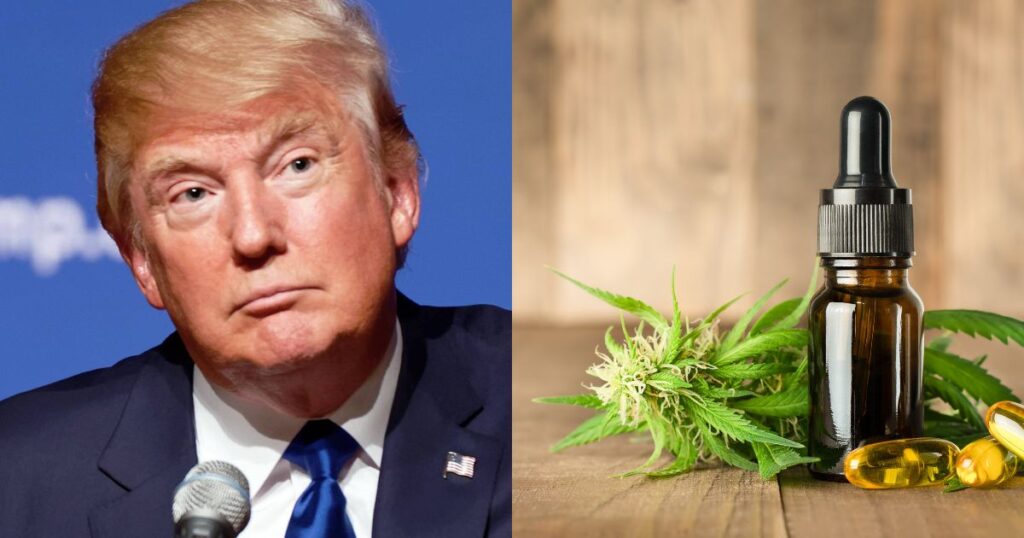In a move that caught many by surprise, President Donald Trump recently shared a video on his Truth Social platform promoting the health benefits of CBD for seniors. The nearly three-minute clip, produced by The Commonwealth Project, suggests that hemp-derived CBD could “revolutionize senior health care.”
This unexpected endorsement of a cannabis compound raises a critical question: is this a genuine effort to improve the health of older Americans, or a calculated political maneuver to influence markets and policy?
The video itself is a compelling piece of advocacy. It introduces viewers to vital bodily system that many of his followers might not have even heard of: the endocannabinoid system (ECS). The ECS helps regulate crucial functions like mood, appetite, sleep, and pain. The video argues that as we age, this system weakens, leading to common age-related ailments. It then positions hemp-derived CBD as a “game changer” capable of restoring the ECS, reducing pain, improving sleep, and even slowing disease progression.
This promotion comes at an important time for the cannabis industry, which is closely watching the Trump administration’s deliberations on rescheduling marijuana. While the video focuses on non-intoxicating CBD, its timing and message have sent ripples through political and financial circles, leaving many to wonder about the true intentions behind this sudden spotlight on cannabis.
A Market Surge and Questions of Intent
Immediately following Trump’s social media post, the market reaction was significant. U.S.-listed cannabis companies, saw their shares surge, with some experiencing double-digit gains. Exchange-traded funds (ETFs) focused on the marijuana industry also reached record quarterly highs, according to Reuters.
This leads to the central question: was the promotion a calculated move to boost cannabis stocks? The video was funded by The Commonwealth Project, an initiative backed by entrepreneur and philanthropist Howard Kessler. The organization advocates for integrating medical cannabis into senior healthcare to reduce costs. While their mission appears to be health-focused, the immediate financial windfall for cannabis companies cannot be ignored.
Critics and observers are right to question the motive. Is this about leveraging the therapeutic potential of cannabis to help seniors, or is it about creating a favorable market environment that benefits investors?
Given the complex relationship between politics and finance, the answer is likely not a simple one. The move could simultaneously be a nod to a growing industry and a genuine, if politically timed, acknowledgment of cannabis’s potential health benefits.
The Endocannabinoid System: An Overlooked Key to Health
For those outside the cannabis industry, one of the most intriguing aspects of the promotional video is its focus on the endocannabinoid system (ECS). The video explains that the ECS acts like a conductor, ensuring all other bodily systems work in harmony. This is not hyperbole; the ECS is a complex cell-signaling network that plays a fundamental role in maintaining homeostasis, or internal balance.
Our bodies naturally produce molecules called endocannabinoids, which are similar to the cannabinoids found in the cannabis plant, like CBD. These molecules bind to receptors throughout the body to regulate a wide range of physiological processes. When the ECS is out of balance, it can contribute to various health issues. The video’s claim that CBD can help restore this system is at the heart of the argument for its therapeutic use.
By bringing the ECS into the mainstream conversation, Trump’s post does more than just promote a product. It highlights a significant, yet largely unknown, area of human biology. Educating the public and medical professionals about the endocannabinoid system is a critical step toward understanding how cannabis-derived compounds can be used to support health and wellness.
Rescheduling vs. Descheduling
The promotion of CBD is occurring against the backdrop of a larger, more significant policy debate within the Trump administration: the potential rescheduling of cannabis.
Currently, marijuana is a Schedule I substance under the Controlled Substances Act (CSA), a classification reserved for drugs with a high potential for abuse and no accepted medical use. The administration is reportedly considering moving it to Schedule III, which would recognize its medical value and ease restrictions on research and commerce.
While rescheduling would be a step forward. It would reduce the significant tax burden on cannabis companies and open doors for more extensive scientific research. However, we argue that rescheduling doesn’t go far enough. The only reasonable solution is the complete descheduling of cannabis, which would remove it from the CSA entirely.
Descheduling would treat cannabis more like alcohol or tobacco, allowing states to regulate it as they see fit without federal interference. This approach, would unlock the full potential of cannabis research. If cannabis were completely descheduled, scientists could freely investigate the plant’s vast array of compounds and their potential benefits for conditions ranging from chronic pain to neurodegenerative diseases.
The research possibilities would be limitless, potentially leading to breakthroughs that could transform modern medicine. While rescheduling is a pragmatic step, descheduling represents the ultimate goal for many who believe in the full therapeutic and economic potential of the plant.
What Happens Next?
Meanwhile, Donald Trump’s sudden promotion of CBD for seniors has ignited a multifaceted conversation about health, politics, and finance. It has thrust the endocannabinoid system into the spotlight, spurred a rally in cannabis stocks, and amplified the ongoing debate about federal cannabis policy.
Many still debate whether a genuine desire to improve senior health or strategic political and financial calculations truly drove this move. What is clear, however, is that the conversation around cannabis in the United States has reached a critical point.
Nonetheless, the immediate next steps will be telling. Will the administration follow through with rescheduling, or will it consider the more transformative path of descheduling?
Will this moment lead to greater education and acceptance of cannabis as a legitimate therapeutic option? Ultimately, the answers to these questions will shape the future of the cannabis industry and could have a lasting impact on the health and wellness of millions of Americans.
















